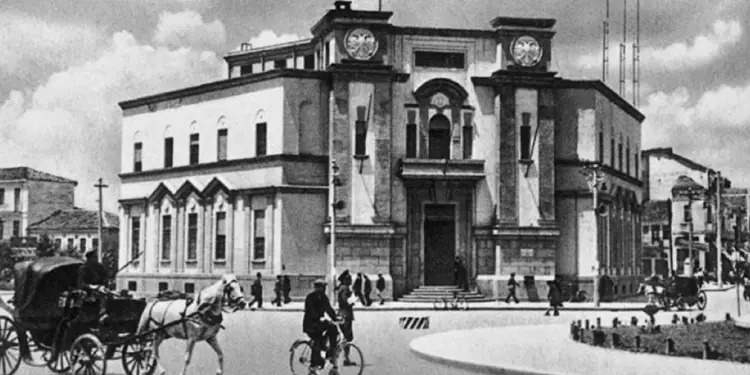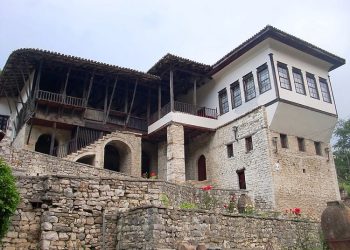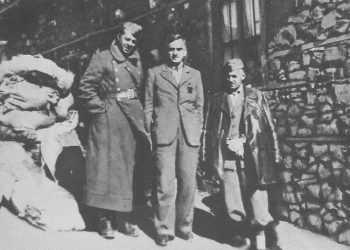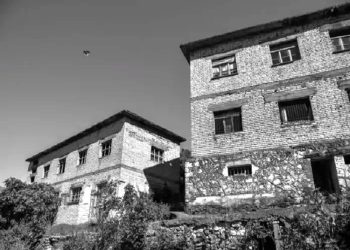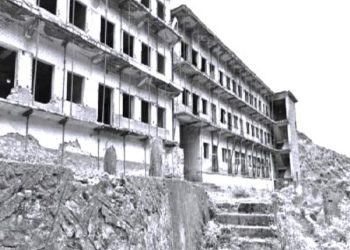Dashnor Kaloçi
Memorie.al publishes the untold story of Rexhep Jella, a famous for one of the most popular autochthonous families who, after schooling in Robert Collage in Istanbul and later in Cambridge, England, returned home and represented Albania at the Conference. of Peace in Paris, he served in several high positions and positions, such as: Senator of Parliament, Member of Durres Prefecture, Prefect of Gjirokastra and Korça, Mayor of Tirana.
His withdrawal from the political scene as early as 1939, although King Zog had one of his favorites decorating it with the grand order of the “Skanderbeg cordon”, to study and administer his properties in the city of Tirana and his farm in the villages of Kashar and Kus.
His refusal to accept the post of Prime Minister of Albania during the German occupation of the country and his arrest by the Communist regime in 1945, along with his son and brother, who was initially sentenced to death, but was later forgiven. the intervention of his close friend, Shefqet Beja.
The long Calvary of Rexhep Jella’s suffering in prisons and internment until 1974, when he passed away in an old barrack on the outskirts of Kavaja, where residents of that town watched as few people attended the funeral. he could never have guessed that one of Albania’s most educated people was attending the cemetery and representing him at the Paris Peace Conference.
None of those residents of the small town of Kavaja, that day in December 1974, watched a small group of people who had come out of a swamp house and walked towards the public cemetery with a casket in their shoulders, they knew that day he was being sent to rest in his last apartment, one of the most educated people in Albania at the time. The 80-year-old, who had been dumped there in an old barrack on the outskirts of Kavaja, was called Rexhep Jella and graduated from Robert College in Istanbul and Cambridge, London. Who was this man, and what was his past that forced those poor people to accompany him to his last home with only a close family circle?
Who was Rexhep Jella?
The Jella family, where Rexhep was born in 1895, are from autochthonous Tyrannical families, and since the founding of the city, their ancestors have been housed somewhere near the Tabak Bridge. Like many of the Jella family who were educated in Turkey, Rexhepi, who studied at “Robert College” in Istanbul, was sent along with his peer Ahmet Zogu from Mati. After graduating high school, Rexhepi returned to his hometown of Tirana in 1914. Here he did not stay long, after the English school where he graduated, granted him a right to study to pursue his studies in Political Science at the University of Cambridge in London. At this university, Rexhepi enrolled in the branch of Jurisprudence, which he graduated with high scores in 1915. In 1916, beginning with his full education, Rexhep Jella was appointed a lawyer in the Austro-Hungarian administration that governed Albania, which was then located in the city of Shkodra.
He is interned by the Austro-Hungarians
In 1916, Rexhep was interned in Mamola, Austria, by the Austro-Hungarian high authorities. Although the true reasons for this internment are not yet known and the exact reasons are unclear, there are several versions of this. The most acceptable of them is that at that time the Austro-Hungarians, with the pretense of deportation, attracted some Albanians who were prominent in the political-military life of Albania, sending them to Vienna to prepare them in colleges and universities to who would one day need them to appoint them to high office in Albania at that time, where they thought to stay long. In this context, it was taken over by the Austrian government and Ahmet Zog. Along with Rexhep Jella, some of the personalities of the nobles of Shkodra at that time, such as Alush Lohja, Rexhep Suma, Himë Loku, were sent to Austria. This is also evidenced by some archival documents that shed light on this period, where Rexhep Jella is mentioned in a letter of exchange between the Austro-Hungarian consul in Shkodra (Krol) and his foreign minister. Also in a telegram sent from Vienna on March 21, 1916, to the consul Krol in Shkodra, it was announced that upon the return of Rexhep Jella from exile, measures should be taken to make him a compulsory residence in Tirana, where his mother resided. It is also known that during his internment in Austria, he continued his political activity, having relations with representatives of the great powers of Antanta.
At the Paris Peace Conference
In 1918, given that Rexhep had been actively involved in Albanian political life, after graduating in 1915, he was appointed as one of the Albanian delegates attending the Peace Conference in Paris. In this respect, although rich archival documentation exists in the Vienna archives, Rexhep Jella’s activity in the political field, from the Peace Conference until 1920, is still well illuminated. From various sources it is known that; that after returning from the Peace Conference, where he was the youngest representative of all Albanian delegations, Rexhepi became actively involved in Albanian political life, along with many other tyrannical patriots, in defense of national interests from danger of smashing its neighbors. After the Paris Conference, he returned to Tirana in 1920 and later settled in Shijak. During this time, Rexhepi, along with several other patriots from the city of Durres, became the initiators of the Lushnja Congress, where he participated in that congress as Shijak’s delegate. In 1921, when the general parliamentary elections were held, he was appointed Inspector General of those elections for the prefecture of Elbasan. After the general parliamentary elections of 1921, Rexhep Jella was appointed mayor of Elbasan and then of Durres. After performing these duties for some time, he was summoned to the Ministry of Foreign Affairs and assigned to the position of Director of Consular Missions and that of the Chief of Protocol of that Ministry. After working for some time with the Ministry of Foreign Affairs, in the elections of 1923, Rexhep Jella was elected deputy of the Durres Prefecture of the Assembly (senator) in the Albanian Parliament.
Mayor of Tirana
After serving for nearly six years the functions of the Durres MP and Parliamentary Assemblyman, as well as that of the Prefect in Korça and Gjirokastra, from the beginning of 1930, Rexhep Jella was entrusted with one of the most difficult and extremely delicate functions. of the Mayor of Tirana. In those years before the Albanian capital, a great number of problems were pending, with the main focus being on urban planning and the construction of some of the main streets and buildings of the central administration, which were then taken over by Italian societies. Thus most of the streets, boulevards, buildings of the state administration and public buildings that were built in 1930-35, have no doubt contributed to the Mayor of Rexhep Jella. One of these constructions, which was made at that time, is the construction of the building of the US Embassy building, which was attended by Rexhep Jella.
Speech in the American Legate
At the inauguration of that complex, attended by the highest authorities of the Albanian Kingdom, after the speech of the Prime Minister Pandeli Evangjeli, the Mayor Rexhep Jella spoke, who among other things said: “Every people to gain independence of his own freedom, he has to make sacrifices, where the greatest and the smallest, and having the help of someone. We Albanians, have gained freedom and independence with our blood, without giving anyone a label or concession to gain freedom. To our state, this people gave way to the Monarchy, putting in place a genius with a strong will and an iron hand, with extraordinary wisdom and unparalleled bravery. It has put the country on the path to civilization and the national flag is flying over all parts of Albania. Secondly, on the occasion of the inauguration of this building of the United States Legate, which forms one of the most beautiful parts of the capital and is the first legate erected to this day, I am mentioning here today with sympathy and love, the American people, who have seen with precision the gain of our political independence, suffice to mention the work of the American Red Cross in the earliest times of our development. The Americans wanted to leave a lasting memory among us, and with the help of the Red Cross, the young men erected the Technical School building to heal wounds and moral illnesses and to combat ignorance. “We, the capitalists, will never forget that it was the American who built the first hospital, where thousands of people were cured, which is the basis of all the hospitals that have been set up and will be set up in this city”.
Does not accept the post of Prime Minister
In 1937, when King Zog decorated some of the personalities of political and social life from all the Prefectures of Albania, Rexhep Jella was decorated with the grand order of the “Skanderbeg Cordon”, for which the Prefecture of Tirana had proposed. After 1935, when Rexhepi left the position of Mayor of Tirana, he was appointed Prefect of Durres, where he was also a deputy of that city. He remained in this position until 1937, where he received the title of Prefect of the First Class. After that, he eventually retired from the leadership position of the local government, remaining only as an MP. He stayed in the city of Durres until 1939, then returned to Tirana, where he continued to reside at his villa near the Tabaks Bridge, along with his wife, Fetie Beshiri, and their three children. After the conquest of Albania, Rexhepi completely retired from political life and locked himself inside his home, pursuing only studies. Given this, in 1943 with the arrival of the Germans, Rexhepi declined the invitation to take the post of Prime Minister of the Albanian government. During all those years that he was cut off from political life, Rexhepi took care of his properties near the village of Kashar (in Kus) on the outskirts of Tirana. In November 1944, Rexhepi, feeling completely pure for what he had done throughout his life, for the benefit of the Albanian state, did not attempt to leave Albania at all.
He is imprisoned by the Communists, with his brother and son
Less than two months after the Communists came to power, on 1 February 1945, Rexhep was arrested and taken to the Tirana investigation. Three months later, on May 26, his son Isufi, who was serving in a Korça unit, was arrested. In an attempted escape, which was in fact a mounted charge, as Isufi had never attempted to escape, a military court sentenced him to death along with his friend, Muharrem Dashi. With the intervention of Shefqet Beja, a close friend of the Jella family, Isufi was pardoned and sentenced to 25 years in prison. Following Isufi’s conviction, Rexhepi was also sentenced to two years in prison on charges of participating in the Monarchy’s governments. According to the archives of the Supreme Military Court, his indictment reads: “Rexhep Jella had an affair with the Secretary General of the Ministry of Economy,” Rocco “, where he brokered a deal by selling them on Corfu. He was linked to the war criminals of the Albanian people, Irfan Ohri and Abaz Kupi and also had a gendarmerie. He has participated with a group of traitorous MPs ”. About two years later, in 1947, the Communists arrested Rexhepi’s brother, Ramazan Jella, who had never been involved in politics. Ramadan failed to go to court because he died after being thrown out of the investigative ladder and after that all the property was seized, and the family was persecuted for years. After Rexhepi’s imprisonment, his villa near Tabak Bridge was sequestered with all the loot, as it pleased a Soviet colonel who personally requested it from Enver Hoxha. After this, Rexhepi’s wife and two daughters were forced to move to the city of Durres and then to Kavaja, near their relatives.
He is imprisoned again, dying in misery
After serving two years in prison in 1947, Rexhepi was again arrested and sentenced to five years in prison, charged with having links to the “Group of Deputies”, led by his close friend Shefqet Beja. One of the reasons Rexhepi was sentenced to only five years in prison was a petition signed by a large number of the residents of the neighborhood where he lived near the Tabaka Bridge, who testified that he had never engaged in activities that conflicted. with the laws of the communist state in force. Rexhepi was able to get out of Burrel Prison where he was sentenced in 1952 and settled with his family in a dilapidated barrack on the outskirts of the city of Kavaja. In 1957, he was released from prison and son Isufi, who until his death in 1986, worked the hardest jobs to earn a living. During all those years that Rexhepi lived in Kavaja, he did not leave home at all, but devoted himself to reading. Rexhepi had a wide culture and was fluent in several foreign languages, such as Arabic, English, Italian, French, and Turkish. He was very passionate about literature, mainly German, where he knew deeply the Goethe, for which he had great weaknesses. Rexhep Jella died in deep misery in 1974 in a half-ruined house on the outskirts of the city of Kavaja, although in the capital city of Tirana, where he had made a personal contribution to building it, he had a villa seized, communists. Memorie.al




